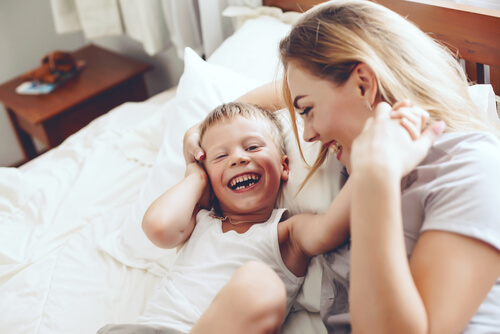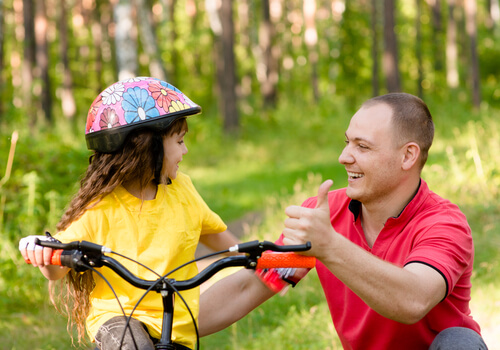5 Tips To Have A Stress Free Childhood

Babies don’t come into the world with an instruction manual. This is why each stage of their development can create certain insecurities for parents. Learn how having a stress free childhood can help you avoid big problems.
Over the past few years, we have observed that children are more stressed during their development. This can sometimes affect their personality and the opinion that children have of themselves.
That is why supporting them during their growth and allowing them to live a relaxed childhood are the keys to becoming a confident adult capable of facing the world.
5 effective tips for providing a happy and stress free childhood
Seeing a happy child is the dream of every parent. In order to do this, you must clearly understand how children shape their personality by exploring the things around them.
You must also observe their reactions to their environment as they learn and discover.
Knowing this will help you determine the keys to providing your child a relaxed childhood. One without stress and full of happiness.
Write down these 5 guidelines and choose the ones that are best suited for your situation.
Give them protection and company
From the moment your child is born, your company and contact are very effective techniques that induce relaxation. In other words, protection and company work as an emotional regulator.
You can also favor this by hugging, kissing and maintaining eye contact with them. Make them feel loved.
Love and affection produce reactions in the body that help reduce stress. They also help to provide a general feeling of well-being.
Stimulate them by allowing them to interact with a variety of people
A child’s growth should be accompanied by the development of their social relationships. Your child should be able to express their emotions to uncles, aunts, grandparents and siblings.
Through these interactions they will be able to generate a protective network that will help them avoid stressful and frustrating situations.
It will also help them to develop resilience, the capacity to overcome adversity without suffering from its consequences.

Teach them to set limits
Teaching your child to recognize limits and respecting them is one of the greatest tips that can help them have a stress free childhood.
Recognizing how far they can get, the strengths they can count on and their level of fatigue will help them avoid irritation, nervousness and frustration.
When something cannot be achieved, you can teach them relaxation techniques. Here are a few examples:
- Taking a warm shower
- Listening to music, writing, reading, watching TV, drawing, dancing
- Running, walking or taking a bike ride
- Walking the dog.
By giving them the tools they need to relax, we’ll be helping them correctly channel the frustrations that occur daily in life.
Show them empathy
One of the first things parents forget is that we were once children. In order to promote a relaxing childhood, it is important for all of the people who surround the child to understand what it feels like to be a child.
We must learn to see things from their point of view. This means we should stop ignoring their achievements, frustrations and discoveries.
If you don’t share your child’s point of view, they will begin to see their problems as unimportant. This is especially true with people from whom the child expects approval and support.

Avoid being overprotective
Overprotected children do not develop autonomy. They also find it difficult to demonstrate their achievements.
Therefore, we must stimulate their abilities by establishing certain norms and reasonable rules that can be flexing when need be.
If we take on this attitude it will help the child to be a confident and optimistic person. They will see problems as challenges from which they can learn to be better people.
In order to provide a relaxing childhood, it is essential for everyone who is involved in the child’s life to understand what it feels like to be a child
Consequences of stress in children
If you do not provide an environment for a relaxing childhood, children with high levels of stress might develop. The consequences of this stress are as follows:
- Psychological and neurological disorders.
- Higher risk of suffering from anxiety. This can lead to drug use and diseases such as schizophrenia.
- Developing diseases such as obesity, hypertension, diabetes, respiratory and autoimmune diseases.
In short, a relaxing childhood forms happy adults. In order to achieve this, try to have a stress free pregnancy.
Avoid stressful situations, live a tranquil life and do exercise.
You should also include your child in your activities. Hug them daily and tell them how much you love them. Give them confidence and they will be the happiest children they can be.
All cited sources were thoroughly reviewed by our team to ensure their quality, reliability, currency, and validity. The bibliography of this article was considered reliable and of academic or scientific accuracy.
- Corraliza, J. A. y Collazo, S. (2011).“La naturaleza cercana como moderadora del estrés infantil”, Psicothema,Vol. 23, no 2, págs. 221-226.
- Orlandini A. (1999). El estrés, qué es y cómo evitarlo.México: FCE.
- Pérez, V. M. O. (1912). El estrés en la infancia: estudio de una muestra de escolares de la zona sur de Madrid capital. Revista Iberoamericana de Educación, (59/2). http://revistarayuela.ednica.org.mx/sites/default/files/5305Mnez-Otero.pdf
- Trianes, M. V. (2002). Estrés en la infancia. Madrid: Narcea.
- Trianes Torres, M. V., Mena, M. J. B., Fernández-Baena, F. J., Escobar Espejo, M., & Maldonado Montero, E. F. (2012). Evaluación y tratamiento del estrés cotidiano en la infancia. Papeles del psicólogo, 33(1).
- Vega Valero, C. Z., González Betanzos, F., Anguiano Serrano, S., Nava Quiroz, C., & Soria Trujano, R. (2009). Habilidades sociales y estrés infantil. Journal of Behavior, Health & Social Issues, 1(1).
This text is provided for informational purposes only and does not replace consultation with a professional. If in doubt, consult your specialist.
